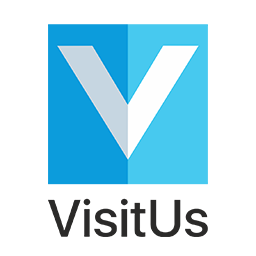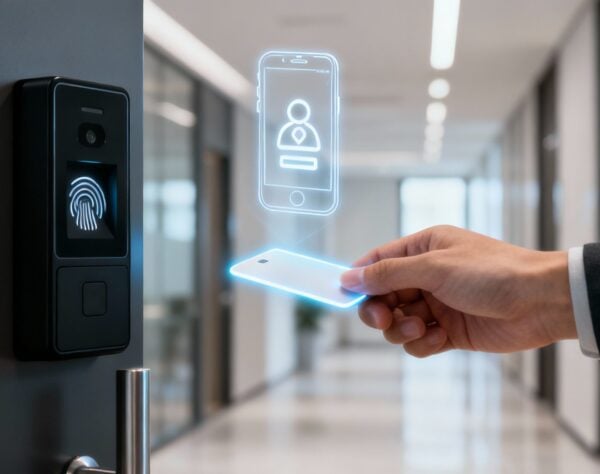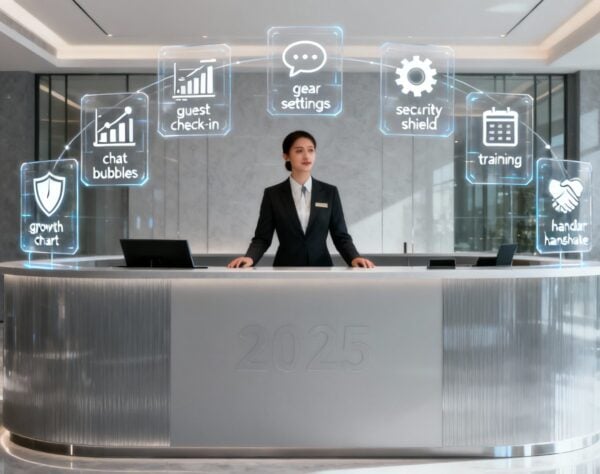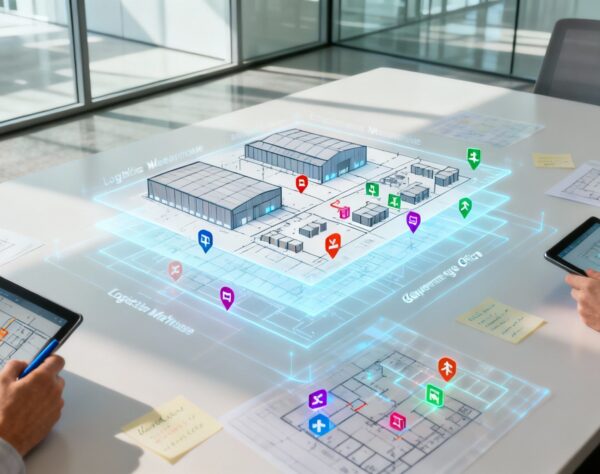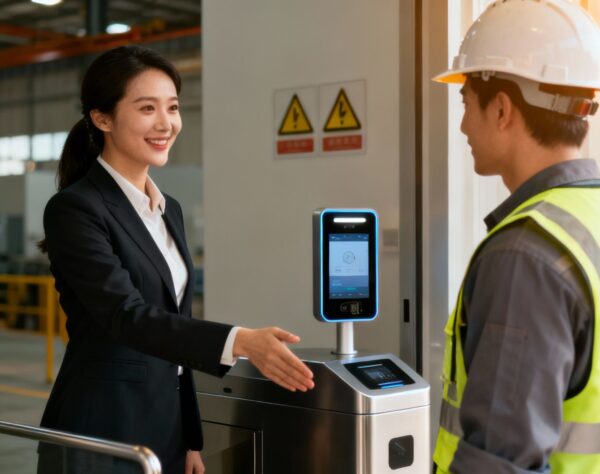
Best Check In Apps for Events
The best check in apps for events do more than just tick names off a list. They create a seamless, secure, and data-rich entry experience that sets a positive tone from the moment guests arrive. A great app eliminates long lines, strengthens on-site security, and delivers a real-time pulse on attendance.
Why Smart Check In Is Crucial for Modern Events
An attendee's first impression happens at your venue's entrance. A slow, disorganized check-in line creates immediate frustration, negatively impacting their perception before the event even starts. Modern check-in solutions transform this potential bottleneck into a smooth, professional welcome that makes guests feel valued.
A streamlined entry, which can cut wait times by over 50%, shows attendees you respect their time. This simple act builds goodwill and encourages better engagement. To see how this piece fits into the larger puzzle, check out this a complete guide to event management.
Enhancing Security and Operational Efficiency
Beyond attendee satisfaction, these apps deliver a massive upgrade to event security and operations. Paper lists are prone to errors and provide zero real-time insight into arrivals. A digital system creates an accurate, time-stamped log of every person who enters, giving you complete control.
This benefit is a game-changer for several reasons:
- Preventing unauthorized access by ensuring only registered guests can enter.
- Managing capacity in real time to avoid dangerous overcrowding and comply with venue regulations.
- Providing accurate records for post-event reporting or emergency services.
Digitizing your check-in provides a level of control and security that is impossible with traditional methods. The resulting real-time data is the foundation for a safer, more organized event.
Leveraging Data for a Better ROI
The most significant benefit of check-in apps emerges long after the doors have closed. The data collected is invaluable for proving—and improving—your event's return on investment. With a robust system, you gain insights into attendance patterns, session popularity, and attendee flow, which allows you to make smarter decisions. For more details, we cover many of the benefits of a visitor management system in another guide.
This data-first approach explains why the global event app market is projected to grow from $1,624.13 billion in 2024 to $1,864.03 billion by 2025. This growth is fueled by the demand for smarter event technology. By adopting these tools, you aren't just solving a logistics problem; you're investing in a system that makes every future event more successful.
How to Evaluate Event Check In Apps
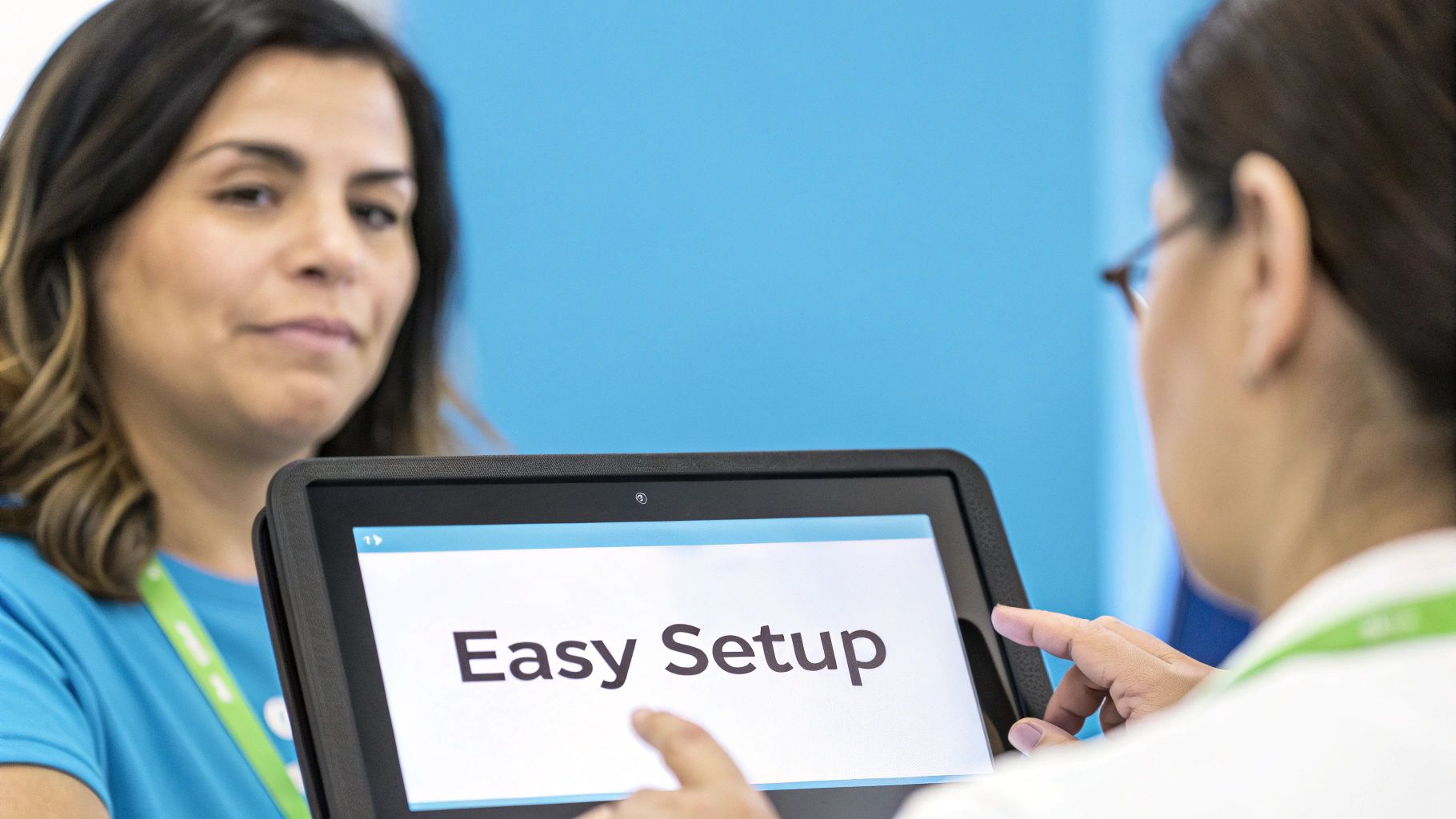
Choosing the right check-in app is about more than a list of features. The real test is its performance on event day, protecting your operations, data, and reputation. Instead of comparing endless features, focus on the core benefits that directly impact your event's success: resilience, security, and support.
The goal is to find a dependable partner, not just a piece of software. A great system should feel like an extension of your team, efficiently managing guest flow so you can focus on the bigger picture. Your evaluation must be grounded in the practical realities of what you need to achieve, shifting from "What can this app do?" to "What benefits will this app deliver for my event?"
Operational Resilience and Scalability
Your check-in process is the first impression guests have, and any failure creates immediate frustration. The primary benefit to look for is resilience under pressure. A system must handle a sudden surge of arrivals—whether hundreds or thousands—without slowing down.
An app that works for 50 people might crash with 500. Scalability is a critical benefit that ensures a smooth experience for any event size. Another crucial factor is connectivity, as unreliable venue Wi-Fi is a common challenge for planners. A system with a robust offline mode is non-negotiable.
A key benefit to look for: "How does the system perform offline?" A resilient check-in app must have a reliable offline mode that syncs data seamlessly once a connection is restored, ensuring the entry process never stops, even if the internet does.
Data Security and Seamless Integration
In an age of strict privacy laws like GDPR, how an app handles attendee information is non-negotiable. A data breach can cause severe legal and reputational damage. The benefit of a compliant platform is building trust with your attendees and protecting your organization from risk.
Beyond security, the app must integrate with the tools you already use. A siloed system creates more work by forcing manual data transfers. The benefit of seamless integration is saved time and reduced human error. Look for how easily the app connects with your existing CRM and marketing platforms, ensuring attendee data flows automatically where it needs to go. For a deeper dive, check out our guide on must-have visitor management system features.
Reliable Event Day Support
Finally, consider what happens when things go wrong. Even the best technology can have hiccups, and on event day, you don't have time to wait in a support queue. The benefit of excellent customer support is peace of mind.
Before committing, ask potential providers about their event-day support. Is there a dedicated line for live events? What are the response times for urgent issues? Choosing a partner with reliable, accessible support means that if a problem arises, an expert is ready to help you solve it immediately, safeguarding your event's success.
Comparing The Top Check In Apps For Events
Now that you know what to evaluate, let's see how the top check in apps for events deliver tangible benefits in the real world. The market is crowded, but the best choice is the one whose strengths align with your specific event needs.
A good comparison goes beyond a simple feature list. What matters are the benefits those features deliver. For example, one app may offer the benefit of advanced security for handling sensitive corporate data, while another provides the benefit of rock-solid offline reliability for an outdoor festival. We'll break down the top contenders by looking at how their user experience, security, and integrations serve different types of events.
Differentiating By Event Type And Scale
Not all events are created equal, and the best visitor management software often serves a specific niche. A powerhouse like Cvent OnArrival is built for large-scale corporate conferences. Its key benefit is the raw power to process thousands of attendees quickly while handling complex tasks like on-site payments and custom badge printing.
In contrast, a tool like Bizzabo focuses on creating a branded, high-touch experience. Its main benefit is weaving the check-in process into attendee engagement, allowing for unique entry experiences for different guest tiers—like VIPs or key sponsors—to make them feel valued from the start.
For organizers of smaller community events, a platform like Eventbrite offers a straightforward solution. The key benefit here is simplicity. It delivers the essentials—ticket scanning and real-time attendance tracking—without the complexity or cost of an enterprise system.
The crucial differentiator isn't what an app can do, but the core benefit it delivers. High-volume events need speed and reliability. Exclusive events need a personalized, white-glove experience.
The data below offers a snapshot of three top-tier apps, comparing their average cost, user satisfaction, and integration capabilities.
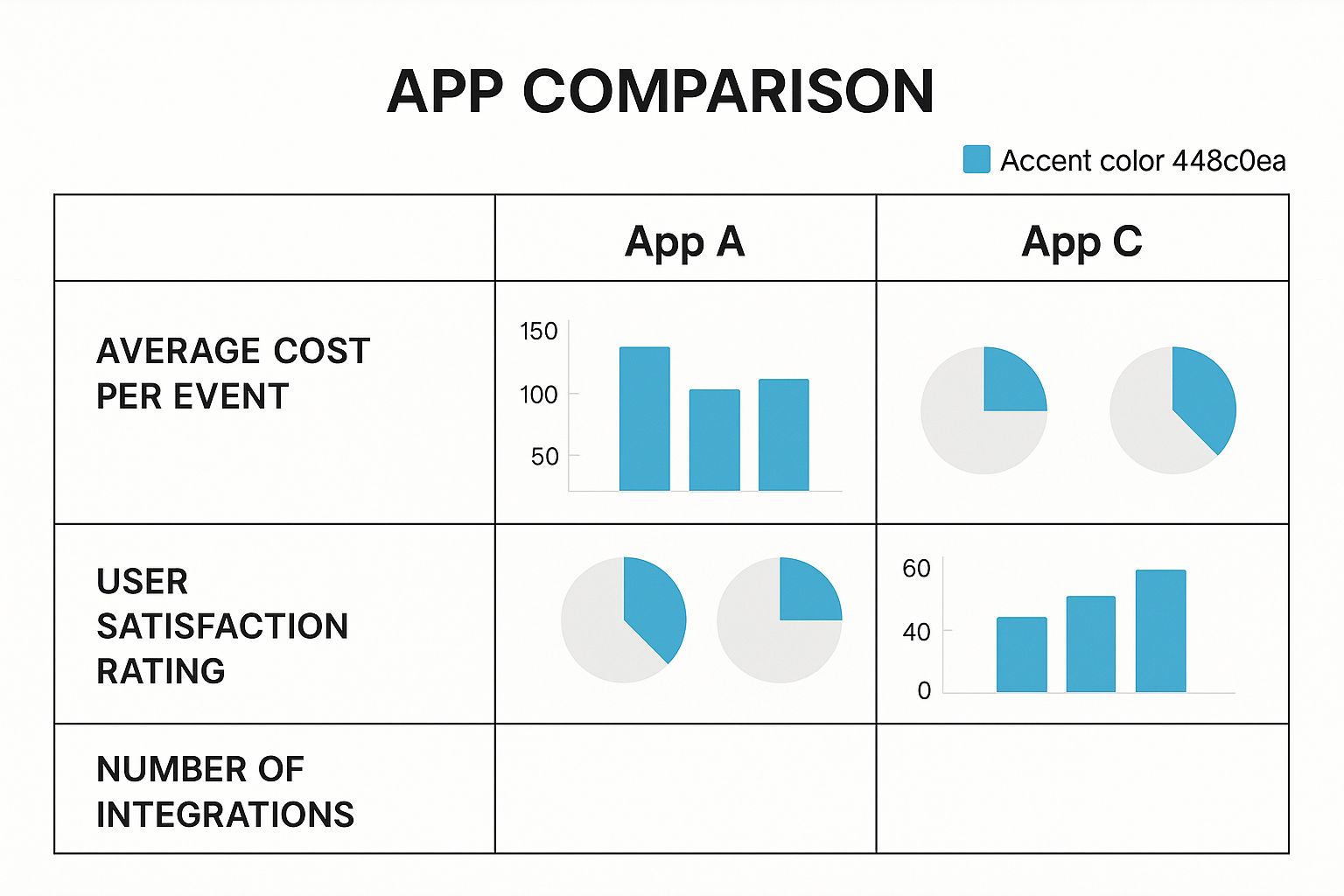
As you can see, while some apps are easier on the wallet, others justify their price with higher satisfaction ratings and more robust integrations.
Security And Integration: A Side-By-Side Look
For events in regulated industries like finance or healthcare, data privacy is paramount. In these cases, a platform’s security benefits are the first priority. End-to-end encryption, secure data storage, and strict GDPR compliance are benefits that shield your organization from massive risk.
Integrations are just as critical for operational efficiency. A standalone app creates data silos and manual work. The real benefit comes when your check-in app syncs flawlessly with your CRM and marketing platforms.
Take Splash, for example. It offers deep integration with Salesforce. The benefit here is that attendee data captured at the door flows directly into your sales pipeline, providing a clear and immediate way to measure event ROI. That automated workflow saves countless hours and ensures no valuable lead data gets lost. You can find more details in our comparison of the best visitor management software.
Before diving into our feature comparison table, let's look at what real users think. Reviews on sites like G2 offer a candid look past the marketing hype and show how these apps actually perform under pressure.

Feature & Benefit Comparison of Top Event Check-In Apps
This table connects features to real-world benefits, breaking down how leading apps cater to different needs. It highlights not just what each app has, but the specific problems it solves.
| App/Platform | Best For (Use Case) | Key Security Benefit | Top Integration Benefit | Scalability Highlight |
|---|---|---|---|---|
| Cvent OnArrival | Large-scale corporate conferences & trade shows | Enterprise-grade compliance (PCI, GDPR) for secure payment and data handling. | Deep integration with the full Cvent ecosystem for unified event management. | Proven to handle 10,000+ attendees with complex session tracking. |
| Bizzabo | Mid-to-large corporate events focused on engagement | Tiered access controls to protect sensitive attendee data for different user roles. | Syncs with marketing automation tools like HubSpot for seamless lead nurturing. | Easily scales from single events to a year-round event program. |
| Splash | Branded marketing events & experiential activations | Secure data capture forms that protect guest information from submission to storage. | Native Salesforce integration for directly measuring event impact on sales pipeline. | Excellent for managing hundreds of concurrent, smaller branded events. |
| Eventbrite | Small-to-medium community events, workshops, & fundraisers | Reliable and secure payment processing through a trusted consumer platform. | Simple social media integrations to drive ticket sales and track promotions. | Great for one-off events but can struggle with complex, multi-day conferences. |
This comparison shows that the right choice depends entirely on your event's goals. A global corporation will prioritize the security benefits of Cvent, while a marketing team will gain more value from Splash's direct link to their sales funnel.
The Growing Importance of Mobile-First Solutions
The shift to mobile is impossible to ignore. The mobile event app market is projected to grow at a CAGR of 8.3%, reaching $1.57 billion by 2033. With corporate events comprising a large share of the massive $1.76 trillion event management market, the demand for sophisticated, mobile-first tools has never been higher.
This trend underscores the need for check in apps for events that offer a superior mobile experience for both staff and attendees. The benefit of an app that works perfectly on any device is increased team flexibility, reduced lines, and a more welcoming arrival experience.
Ultimately, the best choice comes from a balanced look at your specific needs. The ideal app aligns perfectly with your event's scale, security standards, and the experience you want to create. Focus on these core benefits, and you'll find a solution that acts as a true partner in your event's success.
Putting Check In Apps into Practice
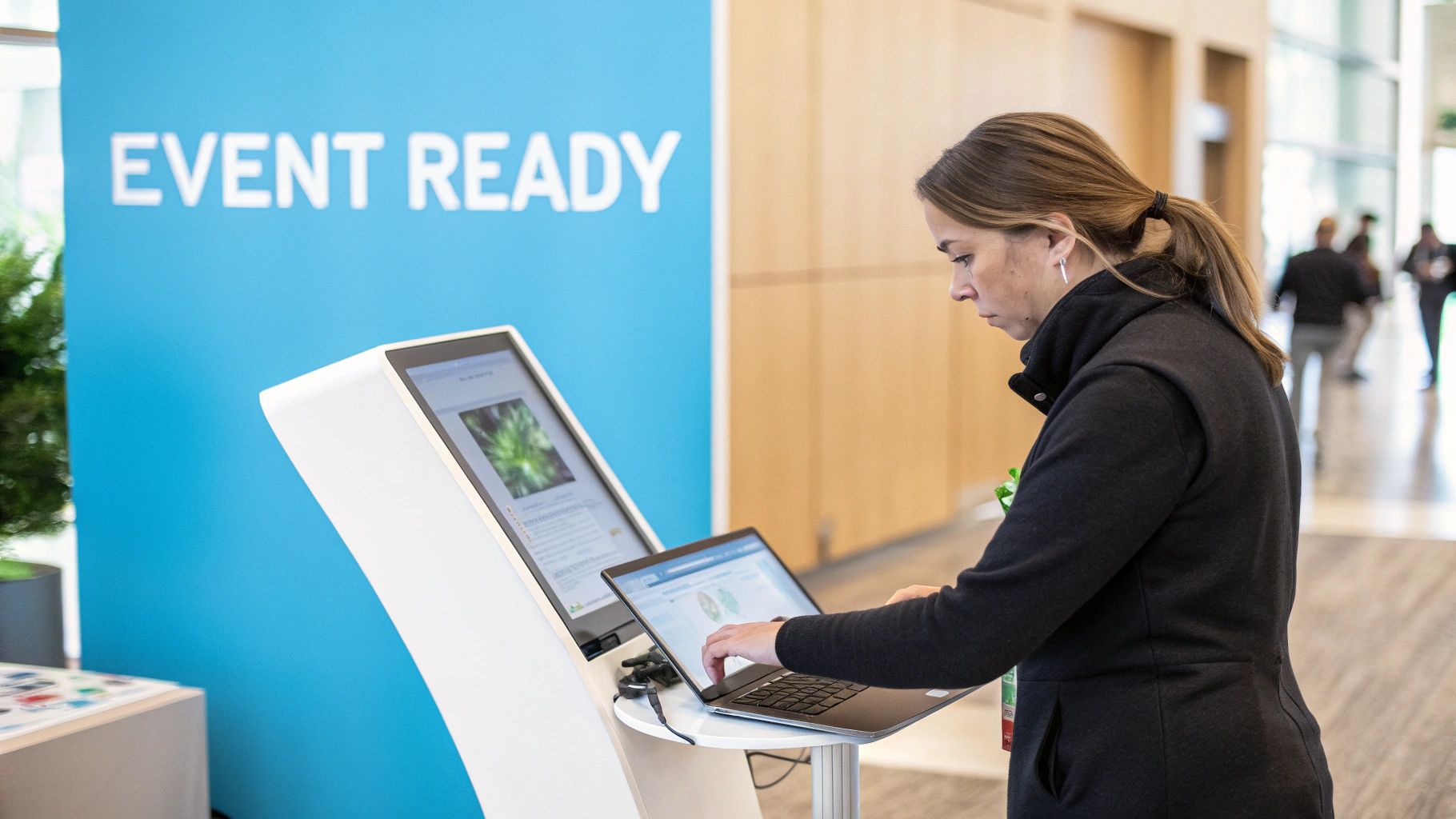
To understand the value of different check in apps for events, you must look beyond features to see how they perform in the real world. The benefits of speed, security, and data only matter when they solve a specific problem. The right app for a high-security corporate summit is entirely different from one for a massive outdoor music festival.
By walking through a few practical scenarios, you can visualize which system will deliver the benefits your event requires. This is about finding the right tool for a unique set of challenges.
High Security Corporate Summits
For a high-stakes corporate summit, security is paramount. The primary goal is ensuring only vetted individuals gain access and that their sensitive information remains secure.
In this situation, the ideal system delivers benefits like:
- Strict Access Control: This prevents unauthorized entry by requiring pre-registration and approval workflows.
- Identity Verification: This goes beyond a name check to confirm an attendee's identity, often by scanning government-issued IDs.
- Encrypted Data Handling: This protects personal and corporate information and ensures compliance with privacy laws like GDPR.
For these events, the check-in process is the first line of defense. The true benefit comes from the peace of mind that a secure, auditable system provides, reinforcing the event's exclusivity from the moment guests arrive.
The ability to create tiered access levels also provides the benefit of a customized and secure experience for VIPs, speakers, and general attendees that is impossible to manage manually.
Large Scale Music Festivals and Expos
Now consider a large music festival or trade show with tens of thousands of attendees. Here, the number one challenge is throughput. The greatest benefit a check-in system can offer is the raw speed to move large crowds through the gates without creating dangerous bottlenecks.
A single person taking an extra 30 seconds at the gate, multiplied by 20,000 attendees, creates hours of cumulative delays and frustrated guests.
These events gain the most benefit from systems built for rapid, contactless entry. A platform that supports RFID or NFC wristbands allows for a tap-and-go experience that can process thousands of people per hour. The primary benefit is a massive reduction in wait times, which directly boosts attendee satisfaction and safety. The benefit of offline functionality is also critical, as large crowds can easily overload local networks.
Exclusive Galas and VIP Experiences
For an exclusive fundraising gala, the check-in experience must set a tone of prestige and personal attention. A clunky process can undermine the high-end atmosphere. The goal is to create a white-glove welcome.
An app designed for this type of event offers benefits that elevate the guest experience:
- Host Notifications: These instantly alert a designated staff member when a VIP arrives, enabling a personal greeting.
- Branded Interfaces: Using kiosks or tablets with the event's branding creates a polished, custom feel.
- Pre-Event Communication: Sending guests a unique QR code and arrival instructions beforehand makes them feel expected and valued.
Here, the visitor management system provides a hospitality benefit. It ensures every high-value guest feels recognized and catered to, reinforcing the exclusive nature of the event and encouraging future engagement.
Using Check In Data to Maximize Event ROI
The true power of modern check in apps for events lies in the data collected from every scan. This information is a goldmine for proving and improving your event's success. When you turn that raw data into business intelligence, you unlock a significant return on your investment.
Every check-in and timestamp tells you what your attendees care about. This is the key to making smarter, data-driven decisions for all future events.
From Attendee Flow to Strategic Insights
The most immediate data layer is about movement. Check-in times reveal peak arrival windows, allowing you to optimize staffing for your next event to eliminate bottlenecks. This benefit improves the guest experience and makes resource planning more efficient.
Tracking which sessions or areas are most popular provides invaluable feedback. This data delivers benefits that help you:
- Optimize Venue Layouts: Place popular sessions in larger rooms and manage foot traffic more effectively.
- Refine Future Content: Provide more of what your audience loves and eliminate topics that don't resonate.
- Strengthen Sponsorship Proposals: Show potential sponsors hard data on booth traffic and session attendance to prove value.
This is more than counting heads; it's about understanding behavior to improve future outcomes. For a complete guide, many organizers learn how to measure overall event success.
Connecting Data to Tangible ROI
Ultimately, check-in data provides the hard evidence needed to justify your event budget. For example, a high check-in rate from a specific marketing campaign proves its effectiveness and shows where to focus future promotional spending.
Your visitor management system is a strategic asset, not just an operational tool. The benefit it provides is turning anecdotal wins into measurable achievements that prove your event's value to stakeholders, sponsors, and leadership.
This data-driven approach is becoming the industry standard. A 2025 report found that 65% of event planners now use onsite check-in tools to improve operations. Furthermore, AI analytics powered by this data can boost event ROI by up to 30%, with nearly 69% of organizers citing event software as key to their success.
Building a Cycle of Continuous Improvement
The data from your check-in app creates a powerful feedback loop. Every event becomes a learning opportunity that makes the next one smarter and more profitable. You can easily view and export visitor statistics to start analyzing these trends immediately.
By using attendance patterns to sharpen your content, elevate the attendee experience, and demonstrate clear value to sponsors, you turn a simple check-in process into the foundation of your entire event strategy.
Choosing and Implementing Your Solution
Selecting the right event check-in app is only half the battle; a successful rollout is what creates a flawless experience. Your final choice should be based on your specific needs, but turning that decision into a smooth process on event day requires careful planning.
A solid implementation starts with your team. Even the most intuitive app can cause chaos if your staff isn't confident using it. Effective training is non-negotiable; well-prepared teams are 70% more productive and can troubleshoot minor issues independently. A quick pre-event briefing can mean the difference between a seamless guest flow and a frustrating bottleneck.
Preparing for a Seamless Rollout
Clear communication with attendees is just as critical as staff training. Send detailed instructions before the event, including a direct link to their QR code and a summary of the arrival process. This simple step reduces confusion and sets a positive tone.
To ensure a smooth operation, use this simple checklist:
- Confirm Technical Support: What day-of support does the provider offer? A direct line for help provides invaluable peace of mind.
- Test Your Hardware: Test all scanners, tablets, and printers well before doors open. Ensure everything is fully charged and functioning correctly.
- Create a Backup Plan: What is your plan if the primary system fails? Have a manual check-in process ready to prevent the entry flow from stopping completely.
The primary benefit of a visitor management system is making a great first impression. A well-planned rollout ensures your technology supports hospitality rather than hindering it.
By preparing your staff, informing attendees, and having a reliable support plan, you can maximize the benefits of your chosen platform and kick off your event successfully.
Your Questions, Answered
Adopting check in apps for events can bring up a few questions. Getting clear answers helps you choose a solution that fits your needs, whether for a small workshop or a massive conference.
How Much Do Event Check-In Apps Usually Cost?
There's no single price. Costs vary based on event size and required functionality. Some platforms charge a one-time fee per event, while others use a subscription model based on attendee numbers.
Basic plans can be very affordable for smaller events. Enterprise-level solutions with high security, numerous integrations, and on-site support represent a larger investment. The key is to focus on the return—if an app reduces wait times by 50% and provides data to attract better sponsors, it often pays for itself.
The best pricing is one that delivers a clear ROI. The benefits of a smooth check-in experience and valuable data can easily justify the cost.
Can These Apps Work If My Venue Has Spotty Wi-Fi?
Yes, and this is a critical benefit for many event planners. Most top-tier check-in apps offer a reliable offline mode, which is essential for venues with poor Wi-Fi or in remote locations.
The app typically downloads the attendee list to your devices beforehand. As you check people in offline, the data is saved locally. Once a connection is restored, it syncs automatically with the cloud. If internet access is a concern, always confirm the robustness of a platform's offline capabilities.
How Do Check-In Apps Make My Event More Secure?
They enhance security by replacing outdated paper lists with a live, digital record of everyone on-site. The benefit of features like QR code scanning and ID verification is the prevention of unauthorized entry and fraudulent tickets, which are common problems with manual systems.
For high-stakes events, some apps provide even greater security benefits. They can integrate with access control systems like turnstiles and may even use facial recognition to ensure only the right people get in. This gives you complete control over who is in your venue at all times.
Ready to create a seamless and secure entry for your next event? VisitUs offers a powerful, intuitive visitor management system that streamlines check-in, enhances security, and provides the data you need to succeed. Find out how our solution can work for you.
